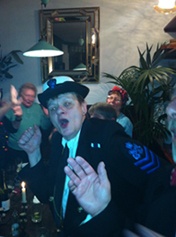On Thursday 12th May I was invited by Maggie Bowers of the University of Portsmouth to join her, Belinda Mitchell and Peter Vincent-Jones to join in a seminar / workshop on Magical Realism at Wymering Manor, just north of Portsmouth. It was a fun evening in which we explored the idea of layers by using LiDAR images of the house taken by Belinda as a starting point to consider what layers could exist in a magical realist context…
The second part of the session was dedicated to getting people writing their own responses to the room through a short workshop we put together. We searched the building for something that fired off our imaginations that we could respond to in a quick ten minute writing session. Here’s what I came up with:
The Gramophone Player
How many voices has that trumpet on the gramphone player played over the years?
Starting in the early years, it played the charity recording Be British – a disc made to raise funds for families of the victims of the Titanic disaster. The performer’s disembodied voice staunchly recited a patriotic poem about the Anglo-Saxon race that stirred the blood of its listeners – delivering the necessary cold compress to the bruised national psyche.
Then there was the voice of Richard Tauber, singing Schumann’s Winterreise that moved listeners to tears. And Al Bowly sang of how Into Each Life Some Rain Must Fall one wistful day in 1933 as the sunlight came in through an open door allowing summer to flood in.
These are just some of the voices the gramophone has spoken with over the years. But what voices has the horn – that giant ear-trumpet – listened to in that room?
If one could play those voices back, it would tell of the lives of the people here. Those in anguish at the declaration of the Great War and of World War 2. The delights of a wedding party on a bright spring day, perhaps? – A photograph still hangs in that room with a garden full of august guests from that very day.
Playing those and many other voices back, we hear in the shadows of the gramophone player’s metal trumpet live accounts of woe and heartbreak, of joy and excitement. We hear the sounds that tell us of England over a period of 80 years. Simple sounds, like the fire burning in the grate or the scolding of the kitchen skivvy by the housekeeper for those dropped plates, voices raised, subdued, loud and secret.
A wheel of voices, circling, spinning round, playing back the life that was here, and somehow as we hear them, making the world anew – a world created from moments of lives not seen, but once heard.
So we come to you – the most recent person this gramophone player has heard. Now, as you stand before it, be careful what you think of when you turn that handle. For time, too, is a circle spinning the universe – and if you don’t clear your mind, you can’t know where you may end up, or when you may arrive, as the voice-rich cogs and springs transport you to that newmade world.









 “Go west, young man,” that piece of advice given to American pioneers who loaded up their wagons and headed into the vast expanses of the unexplored US has been my own mantra when it comes to the slightly less epic short holiday out of Portsmouth.
“Go west, young man,” that piece of advice given to American pioneers who loaded up their wagons and headed into the vast expanses of the unexplored US has been my own mantra when it comes to the slightly less epic short holiday out of Portsmouth. 









